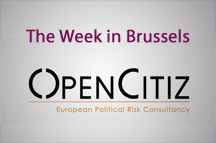 This week has been the last week of campaigning ahead of the first of two rounds of the French presidential election taking place this Sunday. It has been an odd campaign and Europe is anxiously watching what is set to be a national election with potentially huge and unpredictable impact on Europe.
This week has been the last week of campaigning ahead of the first of two rounds of the French presidential election taking place this Sunday. It has been an odd campaign and Europe is anxiously watching what is set to be a national election with potentially huge and unpredictable impact on Europe.
The political offer of France’s presidential candidates does not entirely match the demands of the French electorate anymore, leading to increased uncertainty and unpredictability. The current (presidential and de-facto bi-partisan) political system is obsolete – but no viable alternative has yet emerged.
In the short term, this means the outcome of the election is entirely unpredictable as a quarter of the French electorate does not yet know who they will vote for and four candidates, of which two extremists, are within reach of qualifying for the second round. Three candidates claim to be “anti-system”, but all three do not have any clear legislative backing and hence power.
 Only one candidate is clearly and openly pro-European integration: Emmanuel Macron, the centrist who only founded his movement “En Marche!” a few months ago and has never held elected office. He is leading the latest polls with 23%, but is closely followed by far-right National Front leader Marine Le Pen (22.5%), Republican candidate Francois Fillon (19.5%) and far-left candidate Jean-Luc Mélenchon. The latter is enjoying a new and recent momentum which, if it carries on, could just about lift him to the second round. Both Le Pen and Mélenchon propose extremist programmes and, most importantly from Brussels’ perspective, want to renegotiate France’s position within the EU and call for a referendum on it. Polls still show that a majority of the French would want to stay within the EU.
Only one candidate is clearly and openly pro-European integration: Emmanuel Macron, the centrist who only founded his movement “En Marche!” a few months ago and has never held elected office. He is leading the latest polls with 23%, but is closely followed by far-right National Front leader Marine Le Pen (22.5%), Republican candidate Francois Fillon (19.5%) and far-left candidate Jean-Luc Mélenchon. The latter is enjoying a new and recent momentum which, if it carries on, could just about lift him to the second round. Both Le Pen and Mélenchon propose extremist programmes and, most importantly from Brussels’ perspective, want to renegotiate France’s position within the EU and call for a referendum on it. Polls still show that a majority of the French would want to stay within the EU.
In the medium term, the French legislative elections will be crucial in determining the actual powers of France’s next president in a context where three out of four candidates are unlikely to have a clear and stable majority as what the current system is designed for. France’s next president is likely to be relatively weak compared to his predecessors.
Meanwhile, British PM Theresa May, bewildered by the fact that France’s high risk presidential election was stealing the UK’s show (or so some French like to joke), unexpectedly announced early elections to be held in June. Brussels, as surprised as everyone else, reacted by saying they are “in favour of elections … in general” but tried to pass the message that this would not influence their own plans with regards to Brexit. While May is hoping to get a strong and unified mandate to negotiate Brexit in Brussels, it will certainly not make her task easier from the Brussels perspective.













